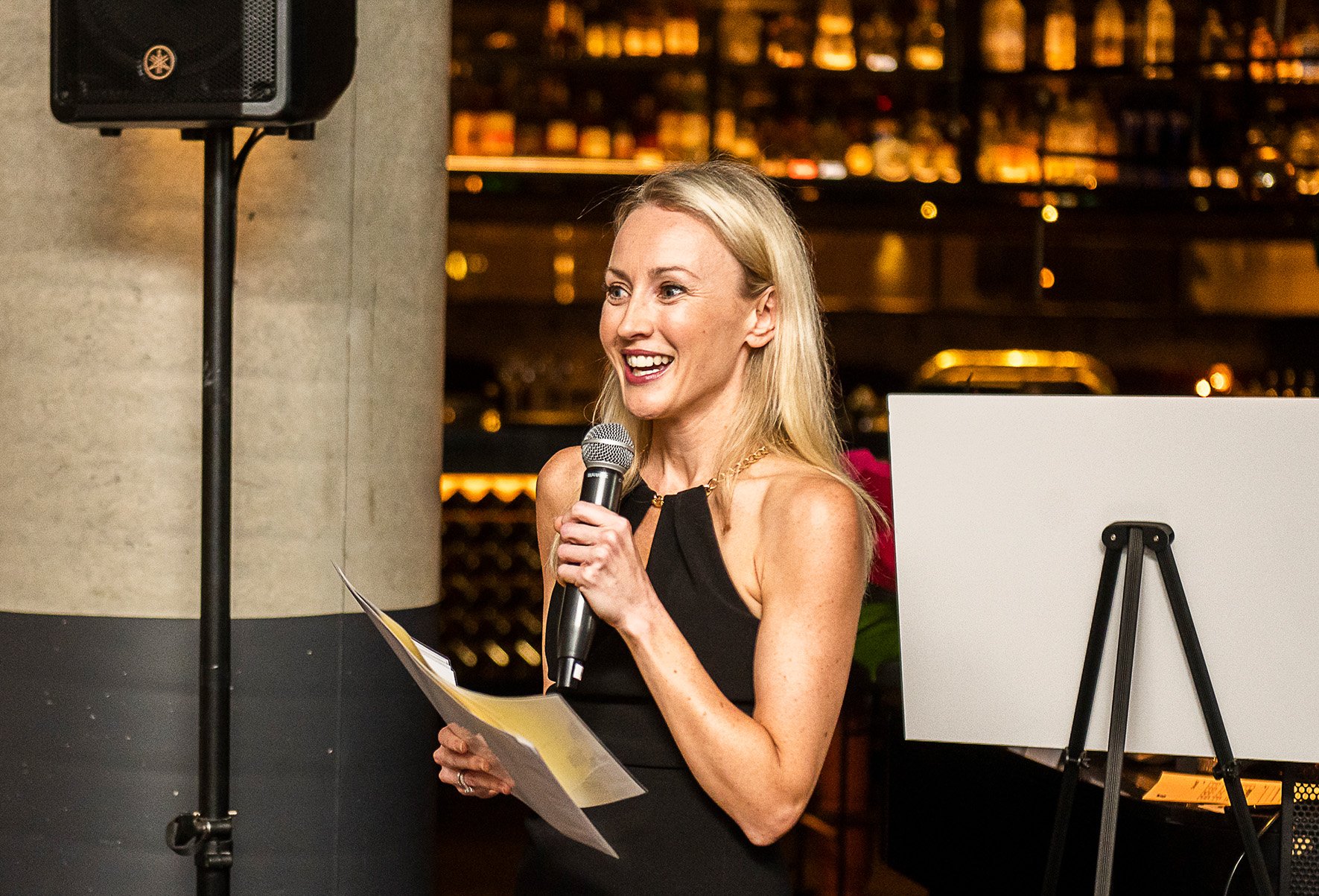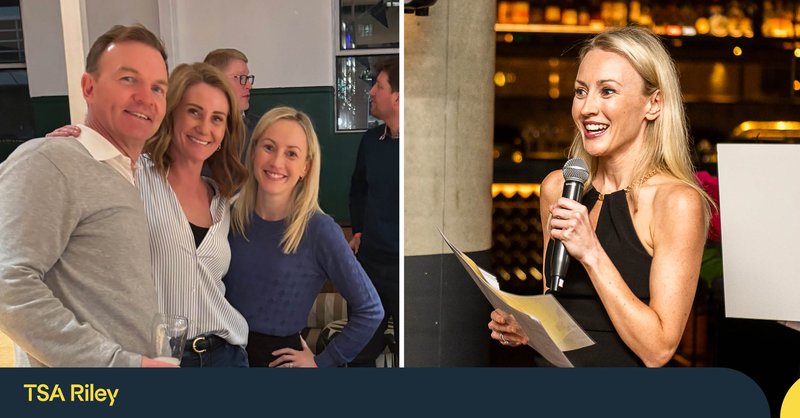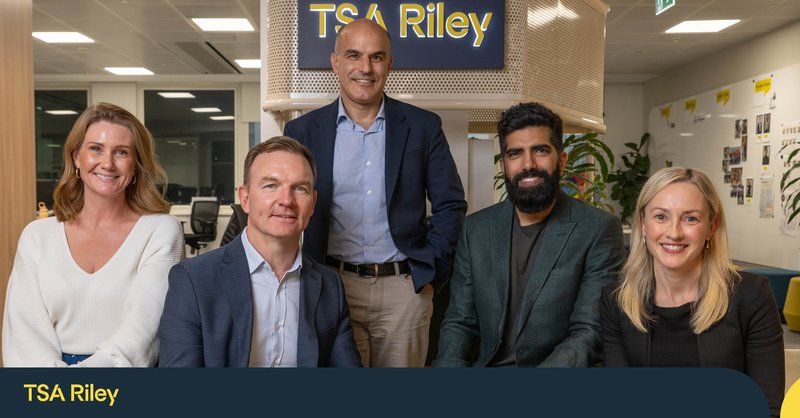Madeleine Steele on balance, growth and becoming GM, Social Infrastructure Victoria

When Madeleine Steele was appointed TSA Riley’s General Manager of Social Infrastructure Victoria, she marked the milestone in typical fashion – by handing in her final MBA assignment. “My study actually finishes at the end of this week,” she laughed.
That blend of pressure and progress is nothing new. Over 10 years at TSA Riley, Madeleine has built her career – and raised 3 children – by sticking to a set of simple personal rules. Including never leaving an email for later. Switching off properly at the end of the day. Being the reason someone else enjoys their job.
Those rules have carried her from a fledgling 2-person office to a leader within today’s 100-strong team, and they continue to shape how she delivers, leads and grows.

The kind of business you don’t outgrow
In 2012, Madeleine was working as an engineer but wanted a different path – one with more client interaction and a chance to use her communication strengths as much as her technical ones. The Property Council of Australia’s mentoring program sparked her interest in project management and led to an interview with TSA Riley (then TSA Management).
“The general manager at the time actually interviewed me at a café, and I soon realised it was because the office was the size of this meeting room!”
It was a young company. When she started, there were just 2 people in the office, including her. Since then, TSA Riley’s Victorian team has grown to 100 people, delivering across 27 sectors and 5 service lines. Madeleine’s career has grown in parallel – and so has her family.
Over the next 10 years, she had 3 children, taking about 15 months’ maternity leave each time. “Every time I came back, we’d changed. And anytime I think I might outgrow the business, something major happens – they acquire a new company, expand to a new country, or create a new sector line. That continual growth means I’ve grown with TSA Riley.”
For nearly that whole decade, Madeleine worked part-time, 3 days a week. “And it hasn’t affected much of my career. I started as a Project Manager, and now I’m a General Manager.” She points to TSA Riley’s support as critical – the company never pressured her to increase her time and made it possible to progress while balancing parenting and, more recently, study.

The biggest driver isn’t profit – it’s making sure the users are happy
When Madeleine thinks back over her projects at TSA Riley, the ones she’s proudest of are those with a direct social impact. One was a $14 million dementia upgrade for an aged care facility in Melbourne that transformed daily life for residents. “Some of these places are just so in need of investment,” she said. “We had this project where they redid a dementia area, and it was amazing what could be done with that sort of money. The landscaping, the deck, the way it connected to the trees in the area – it really changed the surroundings for residents.”
It was in education, though, that she found a space that matched her natural energy and outlook. “I really love education because it’s so idealistic. You walk into a school or a university and everyone is hopeful, everyone has these ideals, and the spaces need to reflect that. You have to almost tap into a student mindset to create good places. It’s invigorating.”
For Madeleine, education projects epitomise stakeholder-driven delivery. “What I really like is that the biggest driver isn’t profit – it’s making sure the users are happy. Yes, you’ve got to hit time, cost and budget, but the measure of success is whether students and teachers love the space. It’s a very different approach to some of the profit-driven sectors, and it really resonates with me.”
That sense of purpose has come through most recently in Swinburne University’s Latelab, a project TSA Riley delivered that quickly became one of the busiest spaces on campus. “From the day it opened, every seat has been taken. The whole idea was to create a space where students wanted to be. With so many studying at home or online, the Latelab gave them somewhere to connect. That kind of space can make a massive difference to mental health. You think about it – a student might meet a friend there, and that connection could be what helps them continue with their study. That’s the power of good environments.”
Looking back, it’s clear why social infrastructure became Madeleine’s home ground. Aged care showed her the impact of projects that meet urgent community needs. Education gave her energy, optimism and purpose. And together, they pointed her towards a career defined not by buildings, but by the people who use them. “I do like government and community-funded projects, because there’s usually so much need and people are just so grateful when the funding comes through. It creates a different dynamic – more collaborative, more focused on the outcome for the community. That’s why I love education and health, and why social infrastructure makes sense as a portfolio for me.”
The art of doing it all: Madeleine’s rules for order in the chaos
Three children, an MBA, and a decade of project delivery and leadership – all on 3 days a week for most of it. Madeleine laughs when asked how she manages it all, but the truth is she’s spent years refining her own rules for balance.
Time management is one of them. “I think it’s critical to understand where to put your energy. I work in 5-minute blocks – constantly asking, what’s the best use of this next 5 minutes? And it becomes subconscious. Even how I pack the dishwasher or walk through the house – I’m always thinking about the most efficient way to do things.”
Supporting her team members is another rule. “I never delegate and walk away. I delegate, see how someone goes, and then delegate a bit more. If they don’t do well, it just means I need to oversee more closely. And I give feedback instantly – everyone in my team knows exactly where they stand, because it’s a one-minute conversation now instead of an hour later.”
Equally important is drawing a line between work and home. “I don’t do any work at night. When I come home, I have dinner with the kids and that’s it – laptop closed. I read before bed, and that’s my time. Because you need to switch off your brain to sleep properly, and sleep is the foundation for everything.”
That same mindset shapes how she approaches high-pressure work like tenders. Her point is that tenders are stressful by nature – long hours, late nights, multiple people under pressure. She said she always tries to be the person others can rely on. “If I can do the tiniest thing to help someone enjoy their job, why wouldn’t I? People remember that. And it’s why my team knows they can rely on me.”
It’s a philosophy that’s served her at work and at home. Reliable, efficient, and clear on boundaries – Madeleine’s approach is less about doing it all, and more about doing what matters, well.

Life outside the laptop
Fresh out of university, Madeleine had planned a South American adventure with a boyfriend. When the relationship suddenly ended, she decided to go anyway. She trekked through Patagonia largely solo before joining a small group tour. “It was amazing,” she said. “We had sunny days the entire time – glaciers dropping into the water, landscapes that felt like New Zealand but wilder. I even toured San Petro Prison. Looking back, it was completely wild for a 22-year-old Australian engineer to experience it on her own.”
That trip proved formative. It taught her resilience, gave her confidence in her independence, and showed her she could throw herself into something daunting and come out stronger.
These days, her adventures look different – weekends with 3 children, grocery runs that have made her husband and kids minor celebrities at the local deli, and evenings reserved for family . But the resilience she found in Patagonia still underpins her leadership today: grounded, dependable and quietly fearless.